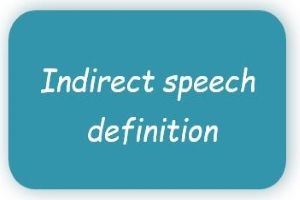Indirect speech definition:
Indirect speech is when we report what someone has said but do not quote their exact words. Instead, we paraphrased their remarks. For example, if someone says, “I’m going to the store,” we might report this as “She said she was going to the store.”
Indirect speech is often used in everyday conversation, as it is more polite than directly quoting someone. It is also more concise, as we can often omit unnecessary details when paraphrasing.
There are a few different ways to structure indirect speech. The word “said,” a pronoun, and the verb “that” are the most frequently used constructions. “She said she was going to the store,” for instance.” Indirect communication also frequently employs the verbs “explained,” “told,” and “asked.”
We would also utilize indirect speech to report questions. For example, if someone asks, “Where is the saloon?” we might report this as “She asked where the saloon was.”
Indirect speech is difficult to use properly; many different rules exist. However, with a little practice, it will become a second type.
- The actual words of the speaker are transformed.
- Said or written in a simple language.
Suppose:
John said I am studying Direct speech
John said that he was studying. Indirect speech
Comparison of the direct and indirect statementss.
- John said, ‘I frequently come here’
- John said (that) he frequently came here
1) The pronoun has changed to indicate the person who spoke (I→he).
2) The verb of the original sentence has changed its tense (Come→came).
3) The two parts (reporting verb and reported sentence) can be connected with ‘that’ or without ‘that’.
Note that if the reporting verb is in the present , there is no tense change.
- What is john saying?
- He is saying (that) he frequently comes here.
The most common reporting verbs for statement are ‘say’, ‘tell’ and ‘explain’.
be careful that with ‘say’ and ‘explain’, you have a choice to describe the person or not. If you mention the person, utilize the preposition ‘to’.
- He said (to her),,,,, , They explained (to us)….
with ‘tell’, you should specify the person:
He told her ,,,,, they told us,,,,,
Tense changes
The tense of the actual sentence changes as follows:
verb ‘to be’ and model verbs
Am/is → was Might → might (no change)
are→were could → could (no change) or
had been able to
Can→ could Shall → should
must→ must (no changes) or had to should → should (no change)
may→ might ought to → ought to (no change)
Tense changes
The tense of the original sentence changes as follows:
others
Used to → Used to (no change)
am/is/are going to do →was /were going to do
Time marker that change:
Time marker sometimes need to change, to keep the sense of the sentence:
- She said: ‘I’ll (will) call you tomorrow‘.
she said she’d (would) call me the next day / the following day.
- John told her ‘I handed in the report the yesterday.’
John told her he had handed in the report the day before.
- He told him we were coming back the following week.
He told him we are coming back the following week.
- she said ‘we did not visit Portugal last year’.
she said they hadn’t visited Portugal the year before.
- They said : ‘we must leave now’.
They said they had to leave then/immediately.
Other words that change.
- ‘this’ and ‘these’ change to ‘that’ and ‘those’:
- She said ‘This is the last bus.’
she said that was the last bus.
- They told us: ‘we’ve chosen these books,’
They told us they’d chosen those books.
2. ‘Here’ changes to ‘there'(if the location has changed).
- We’ve been living here for ten years.
They said they’d been living there fo ten years.
3. ‘would like’ change to ‘want’
remember that ‘I’d like to’ is a formal equivlent of ‘I want’, used only in the present tense. To report a sentence with this statement, utilize the verb ‘want’:
- She said: ‘I’d like to be a physician,’
She said she wanted to be a physician.
- He said: ‘I’d like some rice, please.’
He said he wanted some rice.

